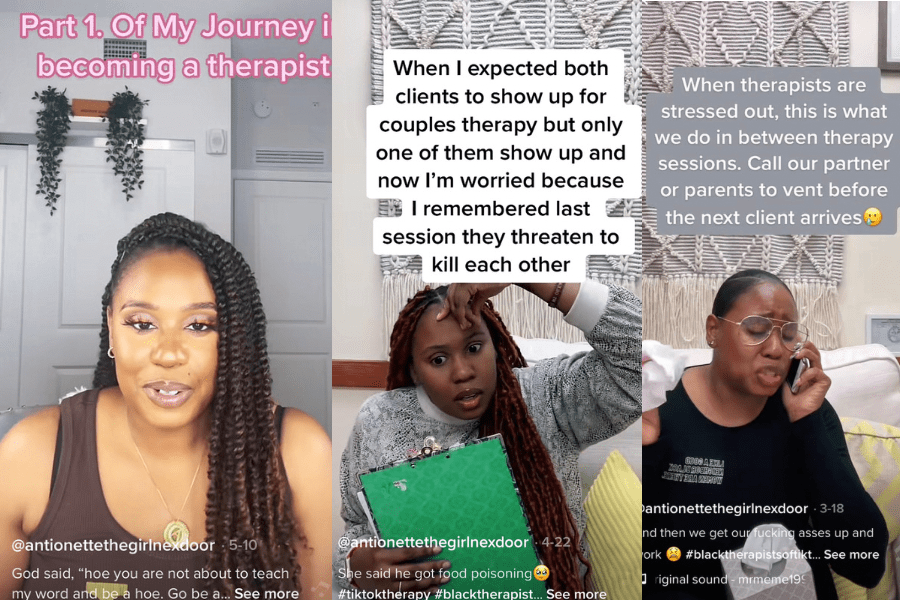Therapy can be intimidating for many people, especially in communities of color, where therapy and mental health is stigmatized. This alone can delay or even cause someone to avoid a diagnosis and subsequent treatment. Often, family members of individuals with a mental health condition just learn to adjust because addressing it can be a difficult, if not fruitless task. Dr. Antionette Edmonds, who also goes by Dr. Toni and “the therapist next door,” is trying to change perspectives on therapy by using humor mixed with real-life situations to show what happens behind the scenes. Her often hilarious encounters with imaginary clients gives prospective clients a chance to see that therapists are real people and are not going to judge what you come into the therapy room to discuss.
Edmonds doesn’t just talk about what clients experience, she also brings humor to what happens when clients aren’t in the room. In one video she records herself pretending to cry on the phone with her partner while a TikTok sound plays in the background saying, “I’m just literally on the verge of a mental breakdown.” She quickly hangs up the phone and puts away the tissue before going to seemingly greet her next client. Edmonds doesn’t shy away from the hard topics, but she does it in such a funny way that it remains relatable and familiarly human.
Edmonds often breaks out her dance moves to participate in TikTok trends, reminding folks that just because someone has the occupation of a therapist doesn’t mean they can’t let their hair down. Her twerking skills are up on legendary, as Lizzo would say, but while she’s grooving to the beat, you can bet that she has an informational message typed out on the screen.
Edmonds achieves a unique balance of professional, informative and hilarious. Normalizing therapy for everyone should be promoted more, but especially in communities of color where increased stigma around therapy keeps people from seeking help. Access to culturally competent affordable mental health care is also a barrier for some seeking services, as communities of color are often underinsured or uninsured.
Culturally in Black, Hispanic and Asian communities, mental health issues are stigmatized by older generations, so kudos therapists like Edmonds who work to bring normalcy to therapy to combat the cultural narrative. While Edmonds doesn’t only see clients of color, her humor in approaching situations that would likely occur working with clients from an urban neighborhood hopefully sparks more interest in seeking therapy. One commenter said, “I don’t find therapists like this on Psychology Today,” complete with a defeated emoji, to which Edmonds replied, “We on there, Psychology Today just keep us on page 36 and not on the first 5 pages.” She finished her comment with several crying laughing emojis.
@antionettethegirlnexdoor Yes, because the 1st of the month will be here soon and we need to make sure he pays the rent #blacktherapistoftiktok #therealtherapistsoftiktok ♬ umm.. yeah – andrew
In another video a commenter said, “I wish you were my therapist,” while someone else commented “Listen!!! Imma need a session with you!” It’s clear that her approach to incorporating her profession into her social media use is changing minds about what to expect from therapy and therapists. Therapists don’t have to be cardigan wearing people who do no wrong, they can also be hilariously human.
If you’re in South Florida, you’re in luck because that’s where her practice is located. Unlike many therapists, as Edmonds confirms in one of her videos, she also weekend office hours available. Hopefully this “therapist next door” keeps dancing and laughing her way through normalizing therapy for everyone.






































